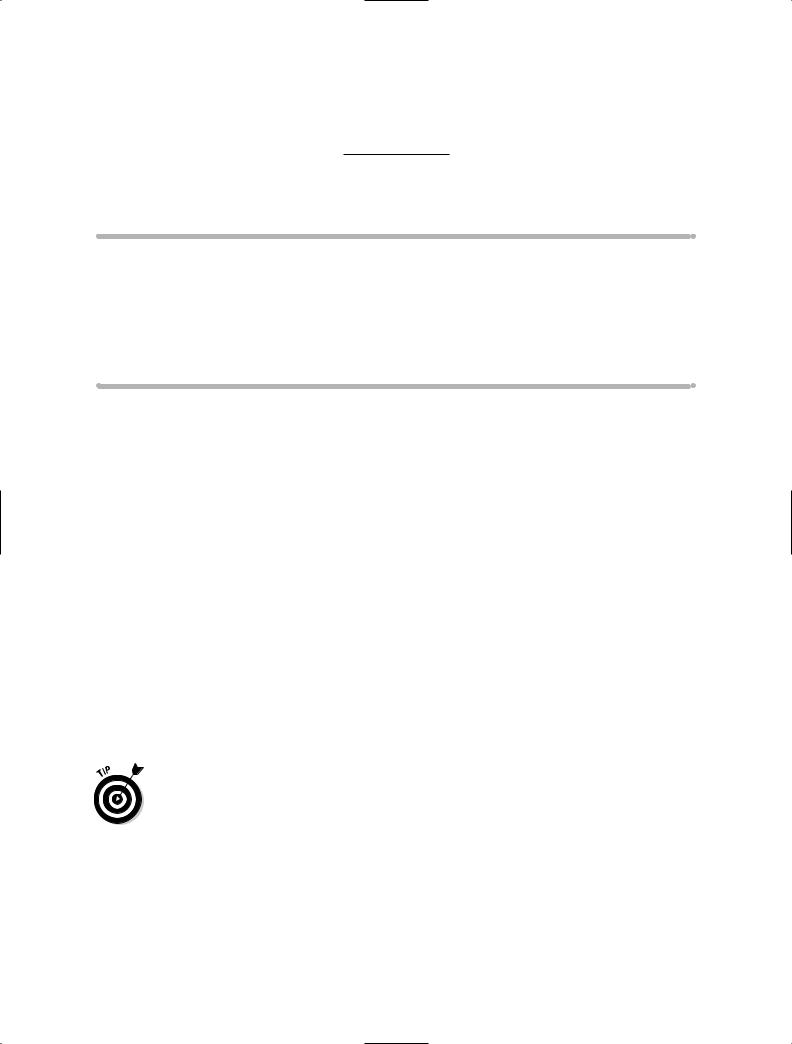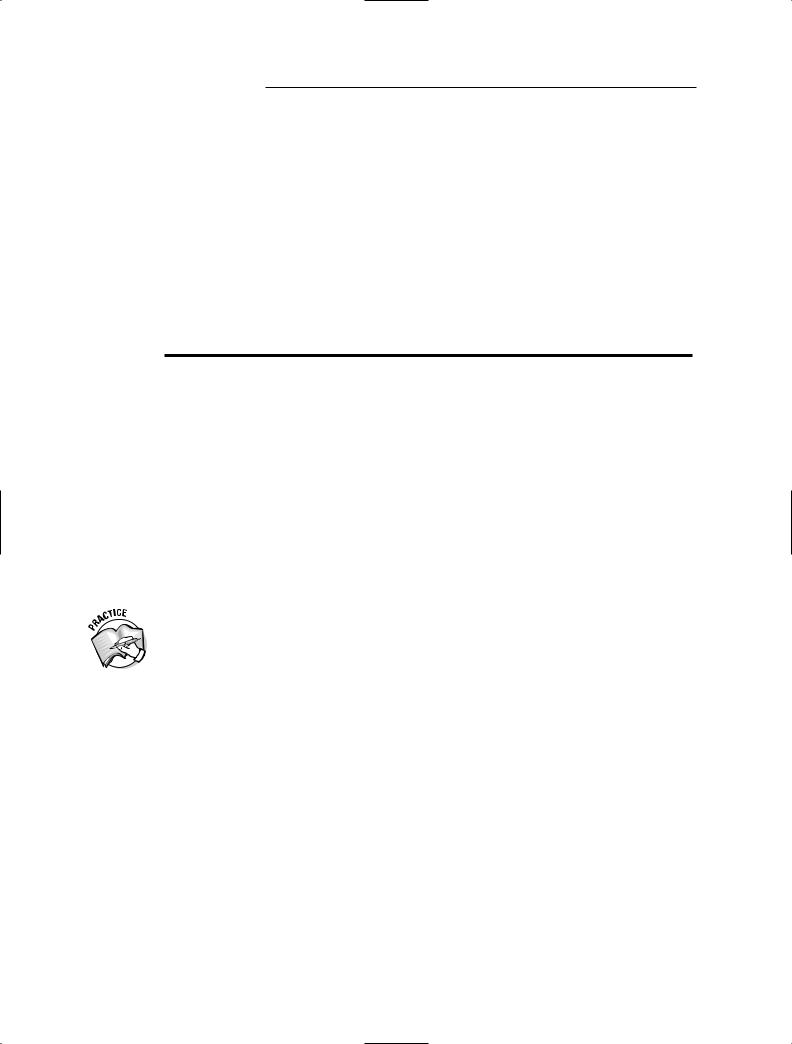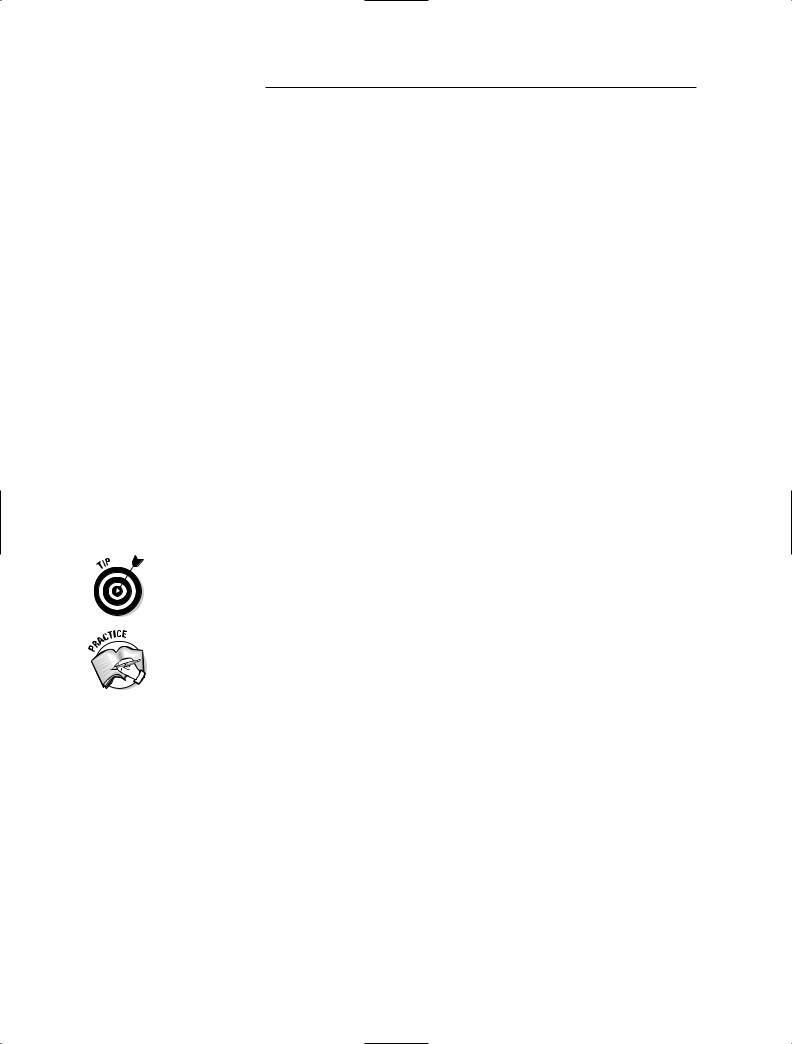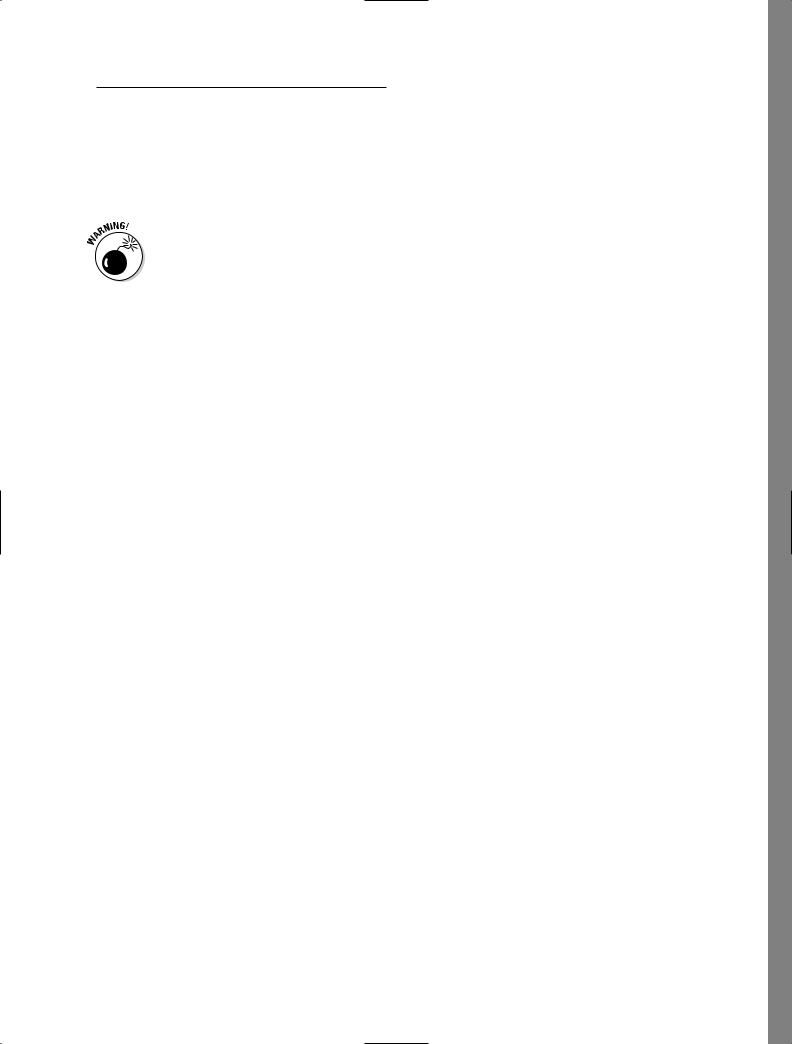
English Grammar Workbook for "dummies" - Geraldine Woods
.pdf
254 Part V: Writing with Style
L The revision cuts repetition; rapid and quick are the same.
MThe sentence Henry came running as fast as he could has been reversed to create an interesting variation on the standard sentence pattern.
NTwo sentences — He neared Darla and gasped. “My angel,” he said. — have been combined. The new version, with an introductory element (Nearing Darla), is more concise.
OA subordinate (that his cardiologist would worry) tucks an idea from one sentence into another. Another possibility: He neared Darla and gasped, “My angel.”
PThe original story ends with several short, choppy sentences. The revision combines all but the last sentence.
QThe last two sentences of the original combine with an introductory verb form, kneeling. If you begin with kneeling, be sure that he or Henry is the subject of the main part of the sentence. You can also revise this section in this way: “Angel Pie, you don’t have to pawn your engagement ring,” he said as he knelt next to her.

Chapter 20
Steering Clear of Tricky Word Traps
In This Chapter
Distinguishing between similar words (affect/effect and so on)
Differentiating between counting words (more/over and the like)
Deleting nonstandard words and expressions
Tracking lie/lay and sit/set
Separating two-word expressions such as a lot and all right
Because little things mean a lot, as the saying goes, this chapter puts your writing under a microscope. The tiny errors that can sink you — a nonstandard expression, a faulty
irregular verb, and the wrong word from a pair of similar words, for example — are in focus here. Peer through the lens and raise your writing to the highest level.
Separating Almost-Twins: Commonly
Confused Words
Do you know any twins who resemble each other but have completely different personalities? One is a professional hang glider, perhaps, and the other a librarian. Then you understand that each half of a similar-looking pair may function in a vastly different way, and woe to the writer who sends one to do the other’s job. This section divulges the ones that trip up most people.
Affect usually expresses action: Mallory’s tantrum did not affect her mother’s decision to leave the candy aisle.
Effect is most often used as a noun and means “result”: One effect of Mallory’s sweet tooth was a truly impressive dental bill.
Both affect and effect may be used in other ways, though much less frequently. Affect as a noun means “the way someone displays emotions.” Effect as a verb means “to bring about a change in the face of opposition.” In this chapter, though, I concentrate on the more common usage for each.
Got it? If you think you know how you’re affected by the effect of these almost-twins, check out the next set of commonly confused words.
Farther refers to distance: Mallory runs farther than anyone else when a candy bar is at stake.
Further refers to just about everything but distance (intensity, degree, time, and so forth): When Mallory thought further about the matter, she decided that artificial sweetener was never a good choice.

256 Part V: Writing with Style
Other pairs (or triplets) are quite different in appearance, but for some reason people mix them up:
Like expresses similarity, but it may not be attached to a subject/verb combo: She jumps like Mike.
As expresses similarity too, but it’s the one you want in front of a subject/verb:
She jumps as Mike does, but she gets paid less for her leaps.
Such as introduces examples: Mallory’s cupboard is stocked with sweets such as pie filling, pudding mix, and chocolate.
The last commonly confused words often go together, but they aren’t interchangeable.
Imply is “to hint”: Mallory never actually asked for a gumdrop, but she strongly implied that one would be welcome.
Infer is “to figure something out that has been implied”: Hearing Mallory’s “Ode on a Gumdrop,” I inferred that the bag of candy would probably be empty after Mallory’s visit.
Can you tell the following twins and triplets apart? Circle the best word or phrase in each set of parentheses.
Q. Fueled by the caffeine in two double-lattes, Jake drove (farther/further) than anyone else.
A. Farther. If you’re dealing with distance, farther is the one you want.
1.The judge insisted on (farther/further) proof that the cop’s speed gun was broken.
2.I gave the judge tons of proof, (like/as/such as) a photo of my car, a statement from my girlfriend about how I always drive slowly, and a perfect-attendance award I earned in second grade.
3.Waving my wallet vigorously, I (implied/inferred) that it was empty and paying the fine was out of the question.
4.(Like/As) judges often do, Judge Crater stubbornly refused to hear my side of the story.
5.“Don’t go any (farther/further) with your testimony,” he snarled.
6.(Like/As) a statue, I shut up and sat as still as a stone.
7.The judge, unfortunately, (implied/inferred) from my behavior that I was silently protesting his ruling.
8.The (affect/effect) of this decision was disastrous.
9.Nothing I said, when I started talking again, (affected/effected) the judge’s ruling.
10.Financial setbacks (like/as/such as) speeding tickets completely wreck my budget.
11.I can’t convince my romantic partner to spend (farther/further) time with me without reservations at an expensive restaurant.
12.High-priced food, in my experience, (affects/effects) the way a potential date reacts; if I plan a bowling evening, my date will (imply/infer) that I’m poor and dump me.

Chapter 20: Steering Clear of Tricky Word Traps 257
Comparing Quantities without Numbers
Lost in the fog of the history of English is the reason why different words are used to describe singulars and plurals when you’re counting or measuring:
More than, many, and fewer work for plurals: more than nineteen witnesses, many problems, fewer than fifty coffee cups. These words work well with things you can count.
Less, much, and over take you into singular territory: less interest in the sport, much unrest, over an hour. These words are best with things you can measure but not count.
The word over is frequently misused in place of more or more than.
Amount is appropriate when the item you’re discussing is singular: the amount of enthusiasm.
Number applies to plurals: the number of bowties.
Between is the word you want when you’re talking about two people or things:
I’m having trouble choosing between pistachio and chocolate chip.
Among is for groups of three or more: Among the twelve candidates for mayor,
Shirley stands out.
Uncover your toes (in case you need to count higher than ten) and take a stab at this sentence. Circle the correct word in each set of parentheses.
Q. Just (between/among) you and me, do you think he needs a dye job?
A. between. You plus me equals two, and between is the word for couples. Among comes into play for three or more, as in among the five of us.
13.The boss sent (more than/over) 300 memos describing when and how we can order paper for the copy machine.
14.We employees, all 4,546 of us, discussed the memo (between/among) ourselves, and despite (many/much) difference of opinion, we eventually agreed on one thing.
15.We decided that e-mail uses (fewer/less) paper and is easier to ignore.
16.The boss’s (many/much) memos scold us for the (number/amount) of paper we waste.
17.Recently, the boss’s secretary collected (more than/over) 5,000 sheets of paper from our desks, all of them memos sent to us by the boss.
18.Surely it takes (fewer/less) energy to shelve the issue altogether.
19.(More than/over) a year ago the boss caught “shredding fever.”
20.The (number/amount) of important material he shredded is impossible to determine.
21.Personally, in a contest (between/among) him and his dog, the dog would win the award for “Best Boss.”
22.The dog would fire (fewer/less) employees.
23.With the dog in charge, the (amount/number) of barking would also decrease.
24.(Among/between) the other candidates for a replacement boss that I would consider are all the inhabitants of New York City.

258 Part V: Writing with Style
Sorry to Bust Your Bubble, but Some
Common Expressions Are Wrong
English should of been easier, I cannot help but think. Being that English is difficult to learn, I’m going to try and spend more time studying it. Irregardless, I’ll still have time to fold origami, a hobby which I can’t hardly resist because it does not have no stress attached to it.
By now I’m sure you’ve figured out that the italicized words in the preceding paragraph are all problematic. In proper English, they don’t exist. If you’re using any made-up expressions, it’s time to remove them from your speech and writing and substitute the correct words, which you can see in Table 20-1.
Table 20-1 |
Correcting Made-Up Words |
Wrong |
Right |
Should of |
Should have, should’ve |
Would of |
Would have, would’ve |
Could of |
Could have, could’ve |
|
|
Cannot help but |
Cannot help [insert the -ing form of the verb]: Cannot help |
|
wondering, for example |
|
|
Being that |
Because |
|
|
Try and |
Try to |
|
|
Irregardless |
Regardless |
|
|
Can’t hardly |
Can hardly |
|
|
Here’s your challenge: Rewrite the following sentences, substituting proper English for any nonstandard terms. I throw a few correct sentences into the mix, so when you find one, simply write “correct” in the blank.
Q. I can’t help but think that your questions about the final exam are extremely annoying.
________________________________________________________________________________
________________________________________________________________________________
A. I can’t help thinking that your questions about the final exam are extremely annoying.
The expressions can’t help but and cannot help but are double negatives. English, not always the most logical language in the universe, is logical in this instance: The two negatives (not and but) cancel each other and express a positive meaning. Thus the original sentence means that you can stop thinking this way if you want to do so.
25.Irregardless of the teacher’s views on technology in the classroom, Mark sends an instant message to his brother.
________________________________________________________________________________
________________________________________________________________________________

Chapter 20: Steering Clear of Tricky Word Traps 259
26. Kevin doesn’t answer immediately, being that he’s in the middle of the sandbox.
________________________________________________________________________________
________________________________________________________________________________
27. “I’ll try and answer Mark after snack,” he thinks.
________________________________________________________________________________
________________________________________________________________________________
28.The teacher doesn’t want no distraction from the peanut butter cookies she has prepared, so she confiscates Kevin’s PDA, which sends and receives e-mail, keeps track of Kevin’s play dates, and handles instant messages.
________________________________________________________________________________
________________________________________________________________________________
29. Kevin should of hidden his PDA until nap time.
________________________________________________________________________________
________________________________________________________________________________
30. Mark can’t hardly believe some of the stories Kevin tells about kindergarten.
________________________________________________________________________________
________________________________________________________________________________
31. Mark remembers his own days in finger-paint land, which he should of treasured.
________________________________________________________________________________
________________________________________________________________________________
32.Because the third grade room is near the kindergarten, Mark could of walked out of the classroom and spoken directly to Kevin.
________________________________________________________________________________
________________________________________________________________________________
33. Kevin can’t help thinking about his PDA, which now resides on the teacher’s desk.
________________________________________________________________________________
________________________________________________________________________________
34. Being that the day is almost over, Kevin asks the teacher to return his PDA.
________________________________________________________________________________
________________________________________________________________________________

260 Part V: Writing with Style
35. “Being in kindergarten is really annoying sometimes,” Kevin thinks.
________________________________________________________________________________
________________________________________________________________________________
36. “I can’t hardly wait until I’m in first grade,” he remarks.
________________________________________________________________________________
________________________________________________________________________________
Verbs That Will Give You a Headache
Sit (not set) yourself down for some practice with four headache-inducing verbs.
Afterward you can lie (not lay) down for a rest.
To lie is “to rest or recline the body.” (Yes, it also means that you aren’t telling the truth, but that definition isn’t a problem.) The past tense of lie is lay. The form of the verb lie that combines with has, have, or had is lain.
To lay is “to place something” or “to put.” The past tense of lay is laid. For lay, the form that combines with has, have, or had is laid.
To sit is “to bend your knees and put your bottom on some sort of surface.” The past tense and the combo form are both sat.
To set is “to place, to put something somewhere.” The past tense and combo forms are also set.
To tell the difference between these two pairs of verbs, think of lie and sit as actions that a person does to himself or herself: I lie down, I sit in the chair. Lay and set, on the other hand, are actions that a person does to something else: I lay the check on the desk, I set the vase down on the piano.
Don’t set down your pen until you try the following questions. Circle the correct form of the verb in the parentheses.
Q. Yesterday Alice was so tired that she (lie/lay/lied/laid, lain) down for a nap even though her favorite soap was on television.
A. lay. The meaning in this sentence is “to rest or to recline,” so the verb you want is to lie, and the past tense of to lie is lay.
37.In the soap, the main character (lies/lays) in bed, comatose.
38.In the world of soaps, the rule is that the doctor must (sit/set) by the bed every day with a look of concern and love on his or her face.
39.In yesterday’s episode, the doctor (sit/sat/set) a bouquet of flowers on the nightstand.
40.When the nurse told the doctor to go home and (lie/lay) down, the doctor replied that she would “(sit/set) down for a while.”

Chapter 20: Steering Clear of Tricky Word Traps 261
41.Last week the doctor (lay/laid) a wreath on the tomb of the unknown soldier.
42.The viewers think the wreath that (lies/lays) there is a sign that the soldier is really the doctor’s long lost lover.
43.During sweeps week, the long lost lover will show up and (sit/set) next to the doctor in the cafeteria.
44.The final show will reveal that the long lost lover has (lain/laid) in a bed, comatose too.
45.While the doctor (sits/sets) there gobbling tuna salad, the lover will explain what happened to the evil twin and other soap mysteries.
Combining Rightfully Independent Words
A few pairs are often written — erroneously — as a single word: a lot (never alot) and all right (never alright). A couple of other pairs have both a singleand a double-word form, and confusing these pairs changes the meaning of your sentence:
Already (by this time) and all ready (completely prepared)
Everyday (ordinary) and every day (daily)
Sometime (at an unspecified moment) and some time (a period of time)
Can you find the correct form in the following pairs? Circle your choices.
Q. Because Jennifer sneezes (alot/a lot), Abigail has (already/all ready) packed a dozen handkerchiefs.
A. a lot, already. The single-word form alot is never correct. In the second parentheses, the meaning you want is “by this time,” so already is the one.
46.The sneezing will end (sometime/some time).
47.Jennifer has devoted (sometime/some time) to the study of the nose and its explosions.
48.She has discovered that most people sneeze at least once (everyday/every day).
49.Jennifer herself sneezes at least ten times a day, so she buys (alot/a lot) of tissues.
50.When Abigail arrived to take Jennifer to the airport, Jennifer was (already/all ready).
51.Jennifer carried her (everyday/every day) handkerchief, a blue cotton square.
52.Abigail packed a fresh outfit for (everyday/every day) of the trip.
53.“Come on (already/all ready)!” sighed Abigail with impatience.
54.“It will take us (sometime/some time) to get to the airport and through security,” she added.
55.“(Alright!/All right!) I’m coming,” yelled Jennifer.

262 Part V: Writing with Style
Calling All Overachievers: Extra Practice with Tricky Words
In Figure 20-1 check out an obituary that (never, I assure you) appeared in a local paper. Whenever you encounter a misused word, correct the clunker. You should find ten mistakes.
Figure 20-1:
Mock obituary filled with errors.
Lloyd Demos Dies at 81: Specialized in Ancient Egypt
Lloyd Demos died yesterday as he was pursuing farther study in ancient Egyptian culture. Demos, who effected the lives of many residents of our town, had alot of varied interests. By the time he died he had all ready learned 12 languages, including ancient Egyptian, and spent some time everyday studying Egyptian grammar so that his writing would be alright. Demos had just set down to supper when the Grim Reaper appeared at his door. Irregardless, Demos insisted on finishing his mashed potatoes, though he was heard to say, “I would like to lay down for a while.” Demos, who wrote over 50 books, will be fondly remembered.

Chapter 20: Steering Clear of Tricky Word Traps 263
Answers to Tricky Word Problems
a
b
further. In this sentence you want a word that indicates a greater degree, so further fills the bill.
such as. The word must introduce a list of examples, so such as is the best choice.
If you introduce examples with like, you exclude those examples. In the preceding answer, like means that the speaker in the sentence did not provide a photo of his car, a statement from his girlfriend, or an attendance award. Instead he provided items that were similar to those on this list.
cimplied. The speaker in this sentence is hinting that his finances are in bad shape, and to imply is “to hint.”
d As. In front of a subject/verb combo, as is the only appropriate choice.
efurther. The verb go makes you think of distance (and farther is the word you want for distance), but testimony is not a road that can be measured. Instead, the judge is referring to time, and further does the job.
fLike. The speaker resembles a statue, and like expresses similarity. Because no verb follows, like is better than as.
ginferred. Picking up on subtle hints, the judge inferred that the speaker was annoyed with the speeding ticket.
h
i
effect. The sentence calls for a noun meaning result. Bingo: effect wins.
affected. Here you’re looking for a verb that’s the same as influence. Affect is that verb.
jsuch as. The tickets are presented as an example of budget-wreckers, and such as introduces examples.
kfurther. Once you’re talking about time, farther isn’t an option, because farther refers to distance.
laffects, infer. Substitute the verb influences and the sentence makes sense. Affect is a verb meaning “influence.” In the second part of the sentence, the date will “figure out,” or infer the poverty.
m more than. Memos, a plural, calls for more than.
namong, much. Because more than two employees are talking, among is the one you want. Between works for couples, not mobs. In the second parentheses, much is the choice because difference is singular.
o less. The word paper is singular, so less is appropriate.
pmany, amount. Many works for plurals, and memos is a plural word. In the second parentheses, the singular paper is the issue. Number works with plurals, but amount is for singular expressions.
q more than. When you’re talking about sheets, you’re in plural land. Use more than.
